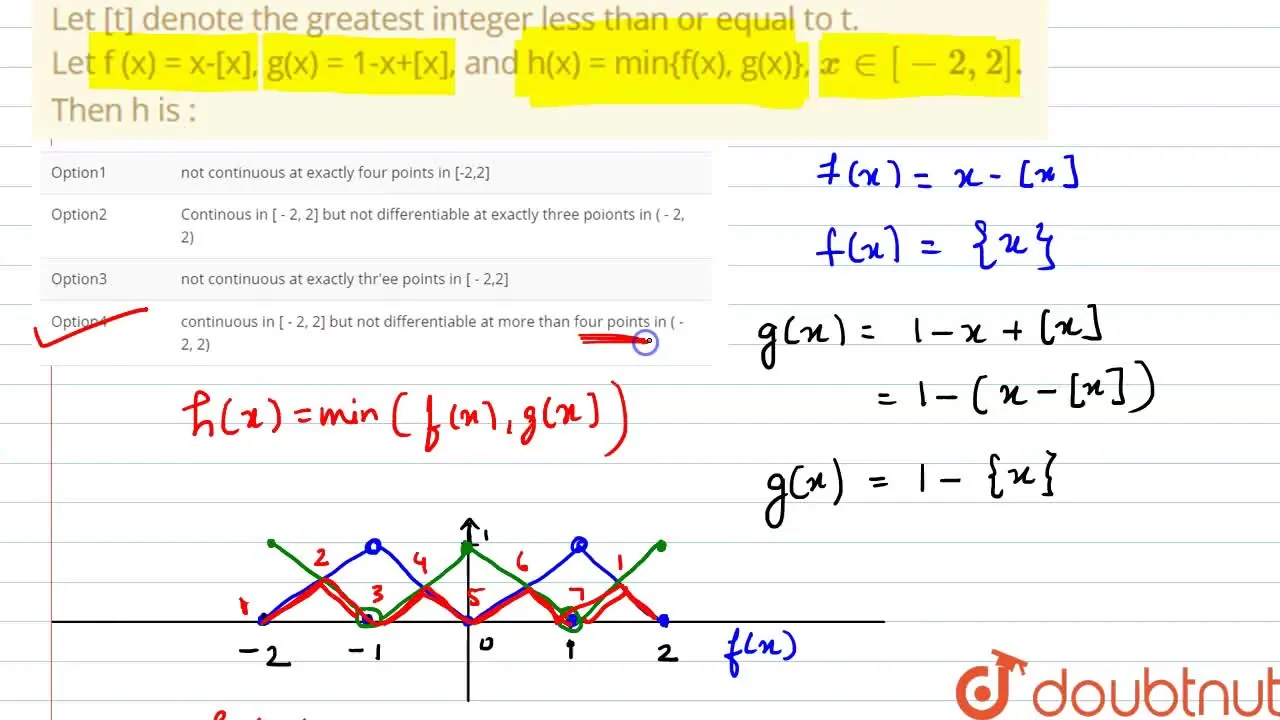Let [t] denote the greatest integer less than or equal to t.
Let f (x) = x-[x], g(x) = 1-x+[x], and h(x) = min{f(x), g(x)}, x∈[−2,2].
Then h is :
not continuous at exactly four points in [-2,2]
Continous in [ - 2, 2] but not differentiable at exactly three poionts in ( - 2, 2)
not continuous at exactly thr'ee points in [ - 2,2]
continuous in [ - 2, 2] but not differentiable at more than four points in ( - 2, 2)
Step by step video & image solution for Let [t] denote the greatest integer less than or equal to t. Let f (x) = x-[x], g(x) = 1-x+[x], and h(x) = min{f(x), g(x)}, x in [-2,2]. Then h is : by Maths experts to help you in doubts & scoring excellent marks in Class 12 exams.
Related Playlists
- BOOK - JEE MAINS PREVIOUS YEARCHAPTER - JEE MAINS 2021EXERCISE - Mathematics (Section B)50videos
JEE MAINS 2021
- BOOK - JEE MAINS PREVIOUS YEARCHAPTER - JEE MAINS 2020EXERCISE - MATHEMATICS250videos
JEE MAINS 2020
- BOOK - JEE MAINS PREVIOUS YEARCHAPTER - JEE MAINS 2022EXERCISE - MATHEMATICS (SECTION - B)10videos
JEE MAINS 2022
Similar Questions
Let [x] denotes the greatest integer less than or equal to x and f(x)=[tan2x].Then
View SolutionLet [x] denote the greatest integer less than or equal to x. Then, ∫−11[x]dx=?
View SolutionLet [x] denotes the greatest integer less than or equal to x. If f(x)=[xsinπx], then f(x) is
View SolutionLet [x] denotes the greatest integer less than or equal to x. If f(x)=[xsinπx], then f(x) is
View SolutionLet [x] denotes the greatest integer less than or equal to x. If f(x)=[xsinπx], then f(x) is
View SolutionLet [x] denote the greatest integer less than or equal to x. Then, ∫1.50[x]dx=?
View SolutionLet [x] denote the greatest integer less than or equal to x. If f(x)=sin−1x,g(x)=[x2]andh(x)=2x,−12≤x≤12,then
View SolutionLet [x] denotes the greatest integer less than or equal to x if x=(√3+1)5then [x] is equal to
View SolutionLet [x] denote the greatest integer less than or equal to x. If x=(√3+1)5, then [x] is equal to
View SolutionLet f(x)=[x2+1],([x] is the greatest integer less than or equal to x). Ther
View Solution


